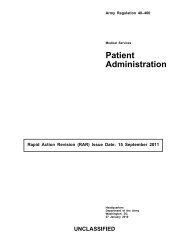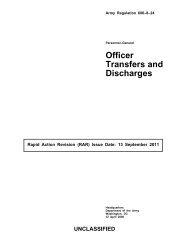AR 600-20, Army Command Policy - Army Publishing Directorate ...
AR 600-20, Army Command Policy - Army Publishing Directorate ...
AR 600-20, Army Command Policy - Army Publishing Directorate ...
Create successful ePaper yourself
Turn your PDF publications into a flip-book with our unique Google optimized e-Paper software.
(c) Personal relationships between members of the National Guard or <strong>Army</strong> Reserve, when the relationship primarily<br />
exists due to civilian acquaintanceships, unless the individuals are on AD (other than AT), on FTNGD (other than<br />
AT), or serving as a dual status military technician.<br />
(d) Personal relationships between members of the RA and members of the National Guard or <strong>Army</strong> Reserve when<br />
the relationship primarily exists due to civilian association and the RC member is not on AD (other than AT), on<br />
FTNGD (other than AT), or serving as a dual status military technician.<br />
(e) Prohibited relationships involving dual status military technicians, which were not prohibited under previously<br />
existing rules and regulations, are exempt until 1 year of publication date of this regulation.<br />
(f) Soldiers and leaders share responsibility, however, for ensuring that these relationships do not interfere with good<br />
order and discipline. <strong>Command</strong>ers will ensure that personal relationships that exist between Soldiers of different ranks<br />
emanating from their civilian careers will not influence training, readiness, or personnel actions.<br />
(3) Gambling between officers and enlisted personnel.<br />
d. These prohibitions are not intended to preclude normal team building associations that occur in the context of<br />
activities such as community organizations, religious activities, Family gatherings, unit-based social functions, or<br />
athletic teams or events.<br />
e. All military personnel share the responsibility for maintaining professional relationships. However, in any<br />
relationship between Soldiers of different grade or rank, the senior member is generally in the best position to<br />
terminate or limit the extent of the relationship. Nevertheless, all members may be held accountable for relationships<br />
that violate this policy.<br />
f. <strong>Command</strong>ers should seek to prevent inappropriate or unprofessional relationships through proper training and<br />
leadership by example. Should inappropriate relationships occur, commanders have available a wide range of responses.<br />
These responses may include counseling, reprimand, order to cease, reassignment, or adverse action. Potential<br />
adverse action may include official reprimand, adverse evaluation report(s), nonjudicial punishment, separation, bar to<br />
reenlistment, promotion denial, demotion, and courts martial. <strong>Command</strong>ers must carefully consider all of the facts and<br />
circumstances in reaching a disposition that is warranted, appropriate, and fair.<br />
4–15. Other prohibited relationships<br />
a. Trainee and Soldier relationships. Any relationship between permanent party personnel and initial entry training<br />
trainees not required by the training mission is prohibited. This prohibition applies to permanent party personnel<br />
without regard to the installation of assignment of the permanent party member or the trainee.<br />
b. Recruiter and recruit relationships. Any relationship between permanent party personnel assigned or attached to<br />
the United States <strong>Army</strong> Recruiting <strong>Command</strong> and potential prospects, applicants, members of the DEP, or members of<br />
the Delayed Training Program not required by the recruiting mission is prohibited. This prohibition applies to United<br />
States <strong>Army</strong> Recruiting <strong>Command</strong> personnel without regard to the unit of assignment of the permanent party member<br />
and the potential prospects, applicants, DEP members, or Delayed Training Program members.<br />
c. Training commands. Training commands (for example, TRADOC and AMEDDC) and the United States <strong>Army</strong><br />
Recruiting <strong>Command</strong> are authorized to publish supplemental regulations to paragraph 4–15, which further detail<br />
proscribed conduct within their respective commands.<br />
4–16. Fraternization<br />
Violations of paragraphs 4–14b, 4–14c, and 4–15 may be punished under UCMJ, <strong>AR</strong>T. 92 as a violation of a lawful<br />
general regulation.<br />
4–17. Standards of conduct<br />
Department of the <strong>Army</strong> personnel must place loyalty to country, ethical principles, and law above private gain and<br />
other personal interests. The performance of their duties should be in keeping with the highest tradition of military and<br />
civilian service to the U.S. Government.<br />
a. Guidance. Minimum standards of conduct required of all Soldiers and <strong>Army</strong> civilians are prescribed by the Joint<br />
Ethics Regulation, DOD 5500.7–R, which provides <strong>Army</strong> personnel with guidance on a multitude of ethical issues,<br />
including the avoidance of conflicts of interests between their commercial/financial interest and their official duties.<br />
b. Annual training. <strong>Command</strong>ers at all levels will ensure that all <strong>Army</strong> personnel required to file either a public or<br />
confidential financial disclosure report, contracting officers, procurement officials, and others identified by an <strong>Army</strong><br />
ethics counselor, receive face-to-face annual ethics training as prescribed by DOD 5500.7–R.<br />
4–18. Employment and volunteer work of spouse<br />
a. The <strong>Army</strong> affirms the rights of a spouse of a Soldier to pursue and hold a job, attend school, or perform volunteer<br />
services on or off a military installation. No DA official will, directly or indirectly, impede or otherwise interfere with<br />
these rights. Moreover, no DA official will use the preferences and requirements of the <strong>Army</strong> or any other DOD<br />
component to influence the employment, educational, or volunteer service decisions of a spouse. Neither will such<br />
<strong>AR</strong> <strong>600</strong>–<strong>20</strong> 18 March <strong>20</strong>08<br />
27
















